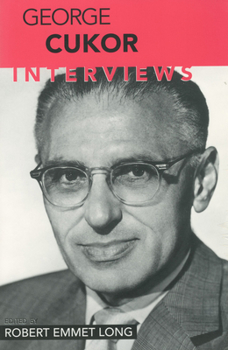George Cukor: Interviews (Conversations With Filmmakers Series)
(Part of the Conversations With Filmmakers Series Series)
Select Format
Select Condition 
Book Overview
For investing movies with an image of style and glamour George Cukor (1899-1983) is considered one of the founding fathers of the Golden Age of Hollywood. The roll call of the great films he made and the stars he directed validates his rank as one of cinema's greatest moviemakers. "The only really important thing I have to say about George Cukor," Katharine Hepburn proclaimed, "is that all the other directors I have worked with starred themselves. But George 'starred' the actor. He didn't want people to say, 'this great director.' He wanted them to say, 'this great actor.'" Along with introducing Hepburn and Greta Garbo to American audiences, he worked with many of the most acclaimed movie actresses of his day, including Vivien Leigh, Olivia de Havilland, Jean Harlow, Elizabeth Taylor, Joan Crawford, Ingrid Bergman, Ava Gardner, Claudette Colbert, Angela Lansbury, Judy Holliday, Audrey Hepburn, and Marilyn Monroe. These interviews are a pleasure to read because Cukor is so immersed in his subject and so forthright in his observations. He comes to life immediately with disarming candor and infectious enthusiasm for cinema and the people who make it. In addition to discussing his romantic comedies, Cukor talks about his famous screen adaptations of classic novels and plays, including Little Women (1933) and David Copperfield (1935). His experience of being fired by producer David O. Selznick partway through the shooting of Gone With the Wind (1939) surfaces in nearly every interview. Instead of having his career derailed by this dismissal, however, he continued his rise as one of America's premier directors. In his cornucopia of films are Holiday (1938), The Philadelphia Story (1940), Adam's Rib (1949), Born Yesterday (1950), A Star Is Born (1954), Let's Make Love (1960), and My Fair Lady (1964). Cukor was a man of myriad dimensions. In his last years he opened up about his private life and his previously undisclosed homosexuality. He was ardent in his friendships and single-minded in his devotion to making quality movies for a popular audience.
Format:Paperback
Language:English
ISBN:1578063876
ISBN13:9781578063871
Release Date:October 2001
Publisher:University Press of Mississippi
Length:191 Pages
Weight:0.90 lbs.
Dimensions:0.7" x 6.1" x 8.9"
Customer Reviews
1 rating
Wonderful multifaceted portrait of Cukor through interviews
Published by Thriftbooks.com User , 17 years ago
George Cukor is another Hollywood director with a reputation for claiming the status of craftsman, not artist, for himself, but he's far more forthcoming than Ford in the George Cukor Interviews book, edited by Robert Emmet Long. If Ford's pose was curmudgeonly and ultimately bitter, Cukor's is witty, self-deprecating, and pragmatic. Told of Cahiers du Cinema's analyses of his films, he says "I'm very amused reading these very nice articles about my work." Asked about his firing from Gone with the Wind, he replies, "I have never wasted time regretting setbacks of this kind; I am too much a fatalist, or perhaps just too conceited for that. I have always felt that if I couldn't make one picture I would just make another." Cukor proves himself an incisive judge of other people's work. He sardonically laments Lawrence of Arabia's narrative slackness: "I didn't know what their point was. It was lost in all those surging masses." Generally he's as respectful of actors in his comments as he is in his films, though he bristled at being called a "woman's director." "That one stuck with me regardless of my other attributes. And I, supine fool that I was, said `Yes, yes, I am.' Now that I'm older, I say `What the hell do you mean?'" Asked what drives him, he replies, "the irrepressible urge to tell people what to do." Included in both the Ford and Cukor volumes are a chronology, a filmography, an index, and a photo gallery.





